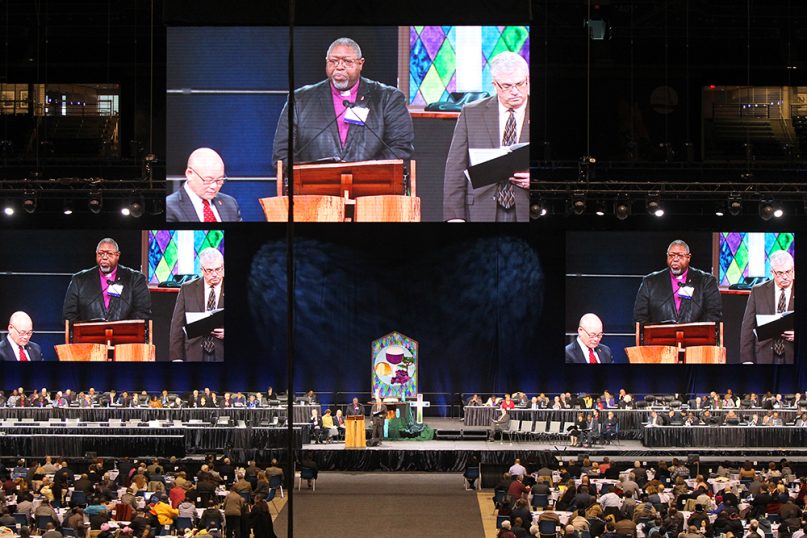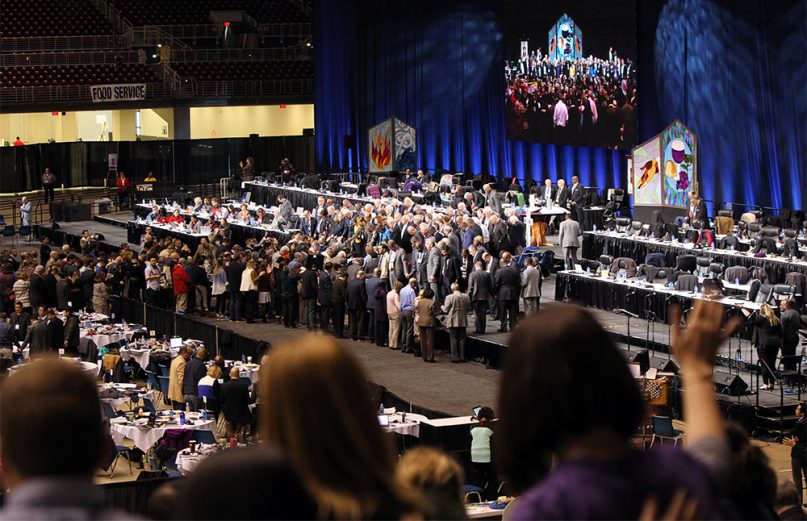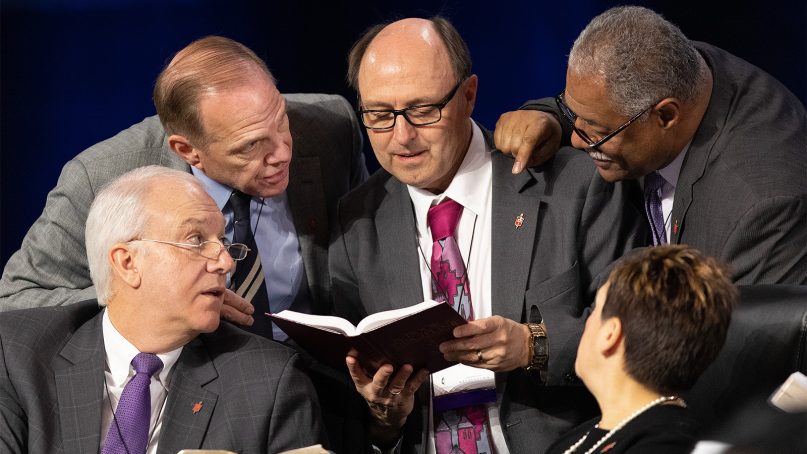
Delegates, bottom, attend the day of prayer on Feb. 23, 2019, ahead of the special session of the United Methodist Church General Conference in St. Louis, Mo. RNS photo by Kit Doyle
(RNS) — Though I am a lifelong Southern Baptist, I followed last weekend’s United Methodist Special General Conference very closely. Over the course of three days, church delegates from all over the world joined together to talk about a way forward for their denomination amid their divisions over sexuality and inclusion — the same debates that have rocked almost all major denominations in the last few years.
I watched impassioned speakers from the more conservative wing call for fidelity to the Word of God and those from the more progressive wing call for unity and a faithfulness to the love of God to all peoples, including members of the LGBTQ+ community.
I have watched closely because, no doubt like many Americans, I am personally connected to the Methodists. I attended graduate school side by side with those pursuing ordination in the UMC, and some of my family members are UMC clergy. It was a small Methodist church that first taught me of the Wesley brothers and their love for the world’s poor. That same church is where I began to hear the term “human dignity” applied to issues besides abortion. Here was a community characterized, historically, by its heart for people.
Their powerful evangelistic spirit is complemented by the strength of their compassion and service to the world. If my Baptist forebears were known for sending missionaries, the early Methodists were known for their work with the poor and hungry.
But I have watched, too, because the Methodists’ size and witness have made them tremendously influential from their beginning. During the First and Second Great Awakenings, Methodism exploded in growth under the preaching of evangelists such as John Wesley in Great Britain and George Whitefield in the United States. By 1968, the year of the founding of the United Methodist Church from the merger of two denominations, there were more than 39,000 Methodist churches in America, or one in every county (thanks in part to a catalog for individuals to buy church plans).

United Methodist bishops and delegates gather to pray at the front of the stage before a key vote on church policies about homosexuality on Feb. 26, 2019, during the special session of the UMC General Conference in St. Louis. RNS photo by Kit Doyle
The sound of American Protestantism, too, is the sound of Methodism. The hymnody of Christianity owes much to the work of the Wesley brothers — favorites such as “And Can It Be That I Should Gain,” “Come Thou Long Expected Jesus,” and “O, for a Thousand Tongues to Sing” were all penned by Charles Wesley. To speak of American religious history is to speak of the Methodists.
So what does the debate happening today mean for all of us?
More is at stake here than just what the denomination will say to its American churches. Roughly 40 percent of the delegates to the meetings are from conferences outside the United States. The responses of these delegates (who, as a group, favor the more conservative plan) call the church to think not only nationally, but also globally. The message from this meeting will speak for and to Christians who are dealing with these same issues throughout the world.
Church leaders of all denominations should be mindful of the events within the UMC. Evangelical churches, the Southern Baptist Church included, should be mindful of the growing support among their younger members on questions of human sexuality. A 2018 study by the Public Religion Research Institute of the next generation found that 53 percent of young white evangelicals favor same-sex marriage. Though evangelicals are still the least supportive, that support is growing. Church leaders must be thinking about how to answer the questions of their congregations.
RELATED: Grieving, but not leaving, the United Methodist Church
So I am glad that the United Methodist Church met to discuss this issue. The issue of sexuality and same-sex marriage does not occupy the same theological space as prudential questions such as welfare reform or climate change practices. Christians of goodwill can disagree on prudential questions and worship together in full communion.
But when one part of the church believes the other to be illegitimate or bigoted, then that true communion is broken. Conservatives feel like the fundamentals of their faith are being betrayed or misrepresented. More progressive members feel that they are being asked to choose between their church or love for LGBTQ+ members.

Bishops confer over the issue of whether the legislative committee can refer items to the denomination’s Judicial Council for review during the 2019 United Methodist General Conference in St. Louis, Mo. on Feb. 25, 2019. Clockwise from lower left are Bishops Thomas Bickerton, John Schol, David Bard, Julius C. Trimble and Cynthia Fierro Harvey. Photo by Mike DuBose/UMNS
Clearly, the passage of the more conservative and biblically orthodox Traditional Plan over the “One Church” plan that was supported by two-thirds of United Methodist bishops shows that the bishops missed a key piece of what was going on in their denomination. This was not a debate about whether each group felt themselves to be Methodists. The bishops mistakenly assumed that if they could work together, then so could the congregations.
However, in a global and diverse body of over 12 million at different points theologically, cooperation was difficult to achieve. Being united in structure or as a body is not the same as being united in mind or heart.
I hope that the United Methodists can still achieve consensus built around a biblically orthodox position that recognizes the worth and dignity of their LGBTQ+ neighbors as image-bearers of God and that is faithful to the biblical understanding of human sexuality.
But as the tally was announced earlier this week, the sizable African delegation could be heard singing in celebration. At the same time, the United Methodist News Service reported that LGBTQ+ activists and onlookers were also singing. The chair called for a song that everyone could sing together. The livestream showed people crying, walking away, or comforting one another. At this point, there was no room for singing together.
This moment was a characterization of the whole process. The members may be united in practice, but they are divided in theology and belief. Whether the denomination fractures or not in the future, it has already fractured in unity and communion. True Christian unity can only occur when there is unity in truth.
I hope my family members (who supported the Traditional Plan) can be gracious to supporters of the One Church Plan. I hope my friends from Vanderbilt Divinity School (who supported the One Church Plan) can be empathetic as they remain in this denomination. I hope that both groups can find healing over the division they currently experience. That healing may take the form of an amicable split or a third option, but I hold out hope that a denomination known for its care for the outside world will also care for those inside its walls.
I long, in short, for a vibrant and strong Methodist church — a church characterized by its evangelistic zeal and care for social concerns. I hope this historic affirmation of biblical orthodoxy is a step toward vibrant renewal in the United States for a denomination birthed in evangelism and characterized by the gospel’s transformation of society.
(Alex Ward is the research and special projects associate at the Southern Baptist Convention’s Ethics and Religious Liberty Commission. The views expressed in this commentary do not necessarily represent those of Religion News Service.)




